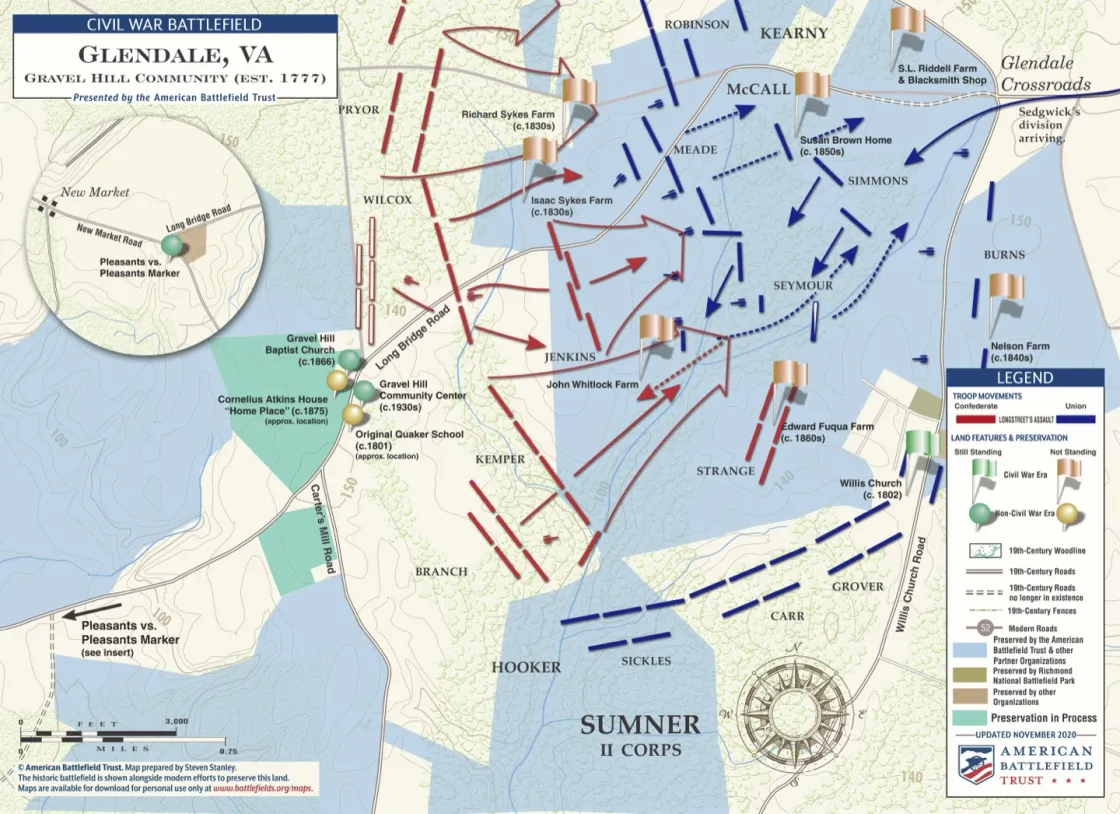Gravel Hill Community at Glendale Battlefield

As visitors meander the extensive Richmond National Battlefield Park, they may come across the Glendale — or Frayser’s Farm — Battlefield. But what some may not know is that this battlefield has a connection to one of America’s oldest Black settlements — a community known as “Gravelly Hill” (or simply “Gravel Hill”). Made possible through the 1771 will of Quaker John Pleasants, his persevering son Robert Pleasants and skilled lawyer John Marshall, 78 enslaved persons gained both their freedom and altogether 350 acres of land after the 1777 case of Pleasants vs. Pleasants was decided in the Virginia Court of Appeals.
On this acreage, Pleasants established a Quaker school for the community, which operated until the early 1830s. It was during that same time that the property was surveyed, revealing the fact that it actually contained 568 acres. Not long after, the property was sold in 1832 to David Bullock, with adjoining property owners including John Whitlock, Jr. and Richard and Isaac Sykes. But the community continued on.
During the Civil War, residents of Gravel Hill — like other free Blacks throughout Virginia — were subject to conscription to support the Confederate war effort. Eventually, warfare made its way to the community. On the afternoon of June 29, Union troops arrived and camped on the edge of Richard Sykes’s farm. The next day, fighting raged across his and his neighboring brother Isaac’s farms, as the crossroads at Glendale became the target for Gen. Robert E Lee’s army. Upon Federals forming for battle on the edge of their property, Richard and his family fled from their home with only a few belongings.
About 900 men were killed and 5,400 wounded during the four-hour struggle at Glendale. Many of their bodies lay scattered over the farms of the Sykes brothers, as well as the Atkins, James, Pleasants, McDowell, and Whitlock properties. Richard Sykes’s house was used as a hospital, and soldiers took farm produce, animals and oak timber from his property. The community was devastated, but not beyond repair.
Following the war, the Sykes and other free Blacks returned, rebuilt and thrived. In 1866, Richard and Mary Sykes donated an acre parcel of land for the construction of Gravel Hill Baptist Church.
In 1872, through the U.S. Southern Claims Commission, Richard Sykes filed a claim for $2,728 worth of losses during the war, while his brother Isaac filed for more than $2,000. Richard received only $514.50 in return, and his brother a paltry $303. Despite the brothers’ declaration of Union loyalty, the return was less than pleasant.
By the 1930s, Henrico County had built a school for the area’s students. While it closed by 1970, it now operates as a community center and houses exhibits on Gravel Hill’s fascinating past. What makes the community even more special is the number of descendants from those original residents that still reside in the area.
The American Battlefield Trust recognizes the special qualities that the Glendale Battlefield possesses and has saved 686 acres there — including the site of the Sykes brothers’ farms. Continuing efforts will further preserve the legacies engrained in Gravel Hill.
Learn more about the Gravel Hill community in this video produced by Virginia's Henrico County.
Henrico County GovernmentHelp raise the $429,500 to save nearly 210 acres of hallowed ground in Virginia. Any contribution you are able to make will be multiplied by a factor...
Related Battles
3,797
3,673
488
679
2,100
5,600
4,900
750





